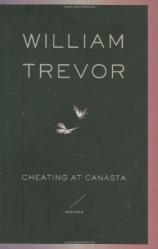Cheating at Canasta: Stories
Review
Cheating at Canasta: Stories
This
latest offering by prolific author William Trevor contains a dozen
short stories. The Los Angeles Times compares his
stories to those of James Joyce and Alice Munro. His writing is
economical, compact and full of nuance. He provides some details as
to what is occurring, but much is left to the reader’s
imagination to determine an actual outcome; he uses subtlety quite
effectively. Trevor’s themes of deception, guilt, loss,
regret, forgiveness and other such topics are crafted around
entirely believable characters and their sometimes tenuous
relationships.
The title story is about promises made and promises kept. Mallory
and Julia had always dined at Harry’s Bar when they traveled
to Venice. Julia, who suffered from memory loss, extracted a
promise from him to return there alone after she was gone. Trevor
hints at Alzheimer’s by the symptoms he provides but leaves
her actual diagnosis to the reader’s imagination. Mallory
visited Julia at her place of confinement, and they attempted to
play canasta as they had so many times over their years together.
Though Julia could not even hold on to her cards, Mallory always
made sure Julia won the game because it made her happy. Mallory is
dining by himself at Harry’s Bar in Venice and feels rather
foolish being there just to fulfill a promise made to Julia four
years previously. While eating his meal and feeling quite awkward
being alone, Mallory overhears a quarrel between two other diners,
and he imagines the discussion he and Julia might have had about
that. As the couple prepares to leave the restaurant, Mallory
engages these complete strangers in conversation.
In “An Afternoon” 15-year old Jasmin meets a
30-something fellow with whom she recently had become acquainted on
a chat line. The stranger takes her to McDonald’s for coffee,
then to an establishment called The Gold Mine where he supplies her
with a little cash to play the slot machines. He wins a prize for
her --- a cheap necklace from a machine. They walk around a
bit, and Clive (by now he has supplied a name, though not his
actual name) offers her some alcohol. The afternoon continues on
with Jasmin agreeing to go back to his place. By now it is apparent
that Clive is the type of stranger all mothers warn their daughters
about. The tone of the story, an undercurrent of possible danger,
is quite effective.
In “Men of Ireland” the topic is guilt. The question is
who is the guilty party and why. A down-and-out drifter named Donal
Prunty returns home to Ireland after an absence of 23 years. While
hitchiking he tries unsuccessfully to panhandle a kindly truck
driver. At the mere mention of money the driver stops the truck and
lets Prunty out. When Donal shows up at the rectory the next day,
the old priest, Father Meade, remembers him and is none too happy
to see him again. Donal hints at what the reader must assume is the
sexual molestation of him when he was an altar boy. The old cleric
is astounded by Donal’s accusations. Why, then, does he
give in and pay Donal? Is it hush money, charitable money, or
money to make him leave?
Nine other stories add more twists and turns to the excellent
writing. In “At Olivehill” a once-prosperous
family struggles to retain their dignity and standing in the
community as they are forced to sacrifice much of their land for
what they believe to be a financially secure future. In “The
Dressmaker’s Child” a young mechanic hits and kills a
young retarded girl. In exchange for her silence, the mechanic
is blackmailed into an unsavory alliance with the child’s
unscrupulous mother.
William Trevor understands human nature and is able to breathe life
into his characters. This collection of short stories would make an
excellent subject for a book club discussion.
Reviewed by Carole Turner on December 26, 2010
Cheating at Canasta: Stories
- Publication Date: October 18, 2007
- Genres: Fiction, Short Stories
- Hardcover: 240 pages
- Publisher: Viking Adult
- ISBN-10: 0670018376
- ISBN-13: 9780670018376




